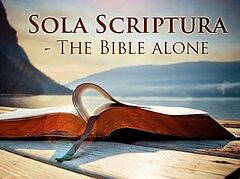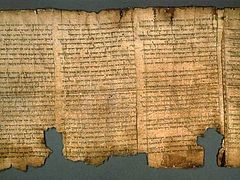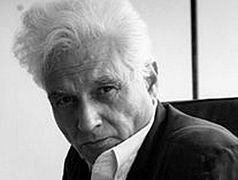The Protestant doctrine of Sola Scriptura holds that the Bible, alone, is authoritative for Christian faith and practice. In this essay, I provide a simple method of testing the doctrine’s validity. I argue that two necessary conditions must be satisfied in order for the doctrine to be true. Before I introduce the first condition, however, it is necessary to address a common argument that many Protestant apologists advance in support of this doctrine.
A Case Against “Solum Consequat”
A couple years ago, my daughters and I found an online recipe for a raspberry swirl pound cake. Wishing to surprise my wife, we decided to bake one for her. We failed miserably. The inedible monstrosity that emerged from the oven bore no resemblance whatsoever to the cake photographed on the recipe’s webpage. What went wrong? After all, I found a recipe that was profitable for instruction on how to bake the cake in order that I would be complete and thoroughly prepared for this good work. Here, of course, I am playing on a passage from II Timothy, with which Protestant apologists are surely familiar. In Chapter 3, verses 16-17, we read the following:
All Scripture is given by inspiration of God, and is profitable for doctrine, for reproof, for correction, for instruction in righteousness, that the man of God may be complete, thoroughly equipped for every good work.
Let us set aside the fact that the Scriptures St. Paul was referring to were the Hebrew Scriptures. The New Testament had not yet existed. It would seem that if we were to accept the logic of those Protestants who cite this passage as a proof text for Sola Scriptura, then we must reject everything, including the New Testament, as superfluous.
Now, I know that it might be tempting to dismiss my analogy of the raspberry swirl pound cake offhand. At a superficial level, it might seem silly to compare one’s approach to the Bible with one’s approach to baking a cake. But consider the deeper similarity. As sufficient as the recipe was, I had very little experience with baking, and no one with the necessary experience was around to guide me so that I would be able to apply these instructions correctly. I learned the hard way that I was guilty of following “solum consequat” (or recipe alone), and the result was a culinary disaster. With respect to the Bible, profitable though it certainly is, there is no guarantee that the believer will interpret and apply its instructions in the correct manner.1
Let us set aside the cake analogy—however helpful comparisons like these may be in leading one to the truth explicated above—and turn, now, to the source that Protestants hold to be the sole infallible authority on Christian faith and practice. This, of course, is an even more effective way of refuting Sola Scriptura. For, if we discover that the Bible, itself, does not teach this doctrine, then we can safely discard it on account of it being a self-refuting doctrine. Let us examine, then, the first condition that must be met in order for Sola Scriptura to be true.
Condition # 1: There Must Be No Interpretive Authority Above the Individual
Scriptural doctrine inescapably has a human component. That is, it takes people to formulate, pronounce and comprehend the doctrines that derive from the Bible, which, of course, cannot directly speak for itself.2 The relevant question, then, is who is empowered to interpret the Bible authoritatively? Proponents of Sola Scriptura insist that individual believers, alone, have this authority. Does the Bible support this view?
Far from denying the existence of an entity above the individual capable of authoritatively interpreting Biblical truth, the Scriptures tell us that the very “pillar and ground of truth” (1 Tim 3:15) is the Church, not the individual believer or the Bible. The Church is a permanent body of believers against which even the gates of death will not prevail (Matt 16:18). This is so because the church is not merely a human institution, but a divine-human (or theanthropic) one. The bible presents the church not merely as an organization, but as an organism, in that it describes her as the very body of Christ. The Church, therefore, is not some biblical fossil, but a living, indestructible, and divine-human body that is guided “into all truth” (John 16:13).
Perhaps the real question, then, is not whether the Bible is sufficient, but whether I am sufficient to interpret it correctly. What Sola Scriptura really amounts to, it seems to me, is “ego solus” (or me alone). But it is necessary to approach the Scriptures with the humility of the Ethiopian eunuch (Acts 8), realizing, as the fathers have taught, that its mysteries are only revealed to the purified.
Condition # 2: There Must Be an “Expiration Date” for Unwritten Traditions
Before I discuss the second condition that Sola Scriptura must meet in order to be true, a brief history lesson is in order. As it is often said, the Bible did not fall from the sky at Pentecost. It is generally agreed that for the first three centuries of Christian history, there was no recognized New Testament canon. It was St. Athanasius who, in 367, first identified the twenty-seven books of the New Testament collectively as canonical in his Paschal letter.
This, alone, should cast doubt on the veracity of Sola Scriptura. For, if the bible held the exclusive role in our spiritual lives that proponents of Sola Scriptura ascribe to it, then would we not have expected the New Testament to have appeared centuries earlier so that the early Christians would not have been left spiritually destitute? Would we not have expected Christ, Himself, to have commanded His disciples to commit His teachings to writing? Of course, this overlooks the fact that most Christians for much of Christian history were illiterate. Therefore, Sola Scriptura begs another question: if God wished to communicate Truth through one medium, alone, why on earth would He choose one that was inaccessible to most people?
What Christ did command was to have his gospel preached to every creature (Mark 16:15). In other words, the truth was taught orally. Afterwards, we find St. Paul exhorting the Thessalonians to stand fast and hold the written and unwritten traditions (2 Thess 2:15). Some Protestants will argue: “Although that might be the case, only the written traditions remain authoritative today.” But remember: according to Sola Scriptura, all authoritative doctrines must be biblically derived. So, for this argument to have any merit, there must be biblical evidence of a sort of “expiration date” for the authority of the unwritten traditions. Is there, for instance, scripture that prophecies the creation of a new, written testament—for some reason centuries after the Ascension—that will displace all other traditions? I have yet to find any, myself.
Conclusion
To summarize, the doctrine of Sola Scriptura meets neither of the two necessary conditions that must be satisfied in order to be true. This is why non-Protestants often say that Sola Scriptura is a self-defeating doctrine. Scripture, itself, does not teach that it, alone, is authoritative for the faith and practice of the believer.
As I see it, therefore, the question each Christian should ask of himself is this: Do I have enough faith to entrust the Body of Christ, and not myself, with the teaching and preservation of the Truth? Am I willing, in other words, to renounce my own papacy and adopt the mind of the Church?





